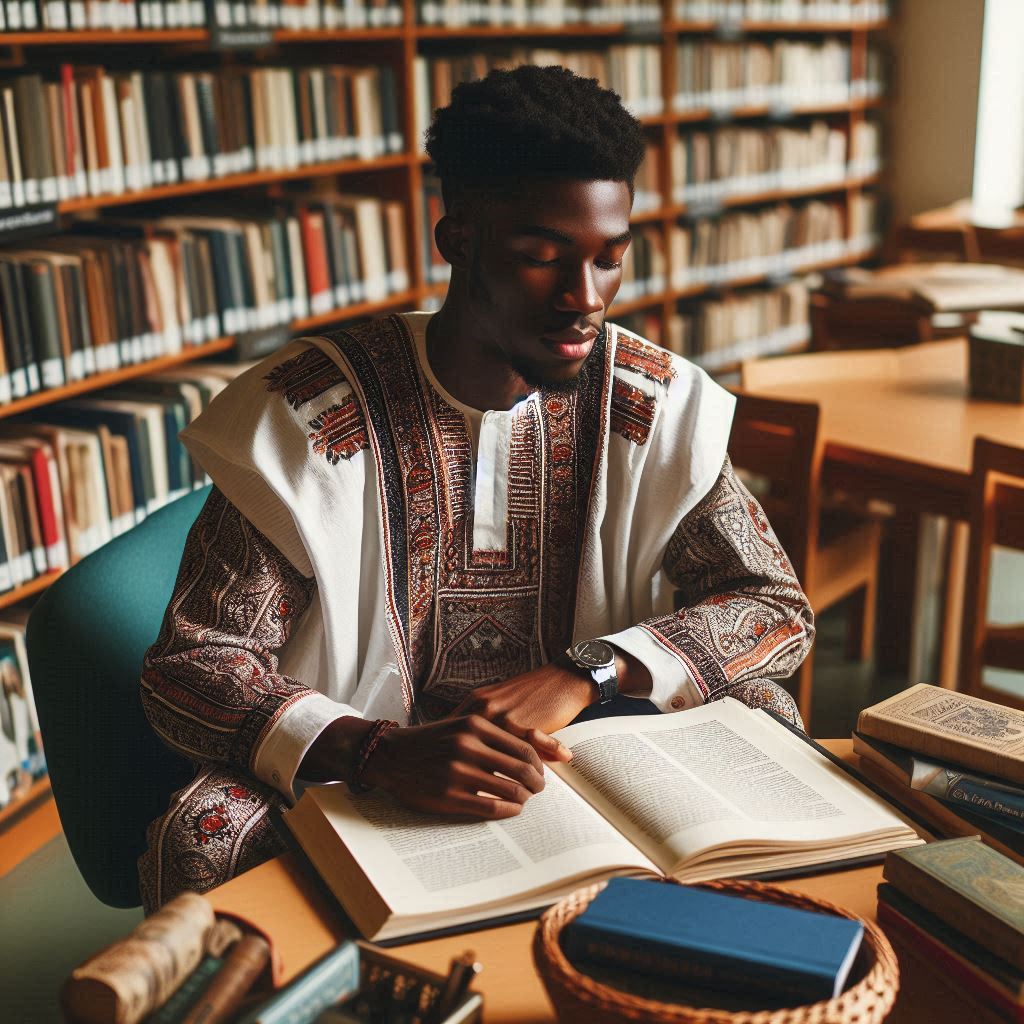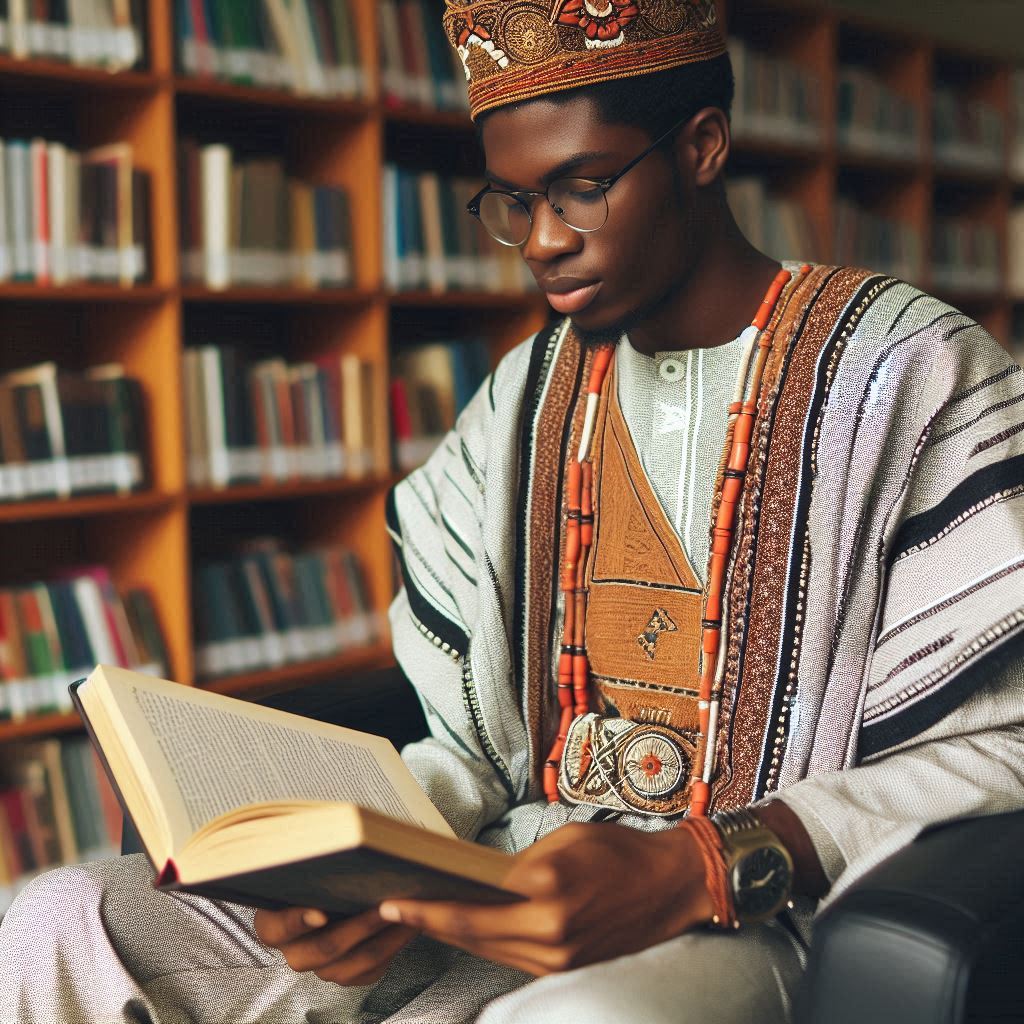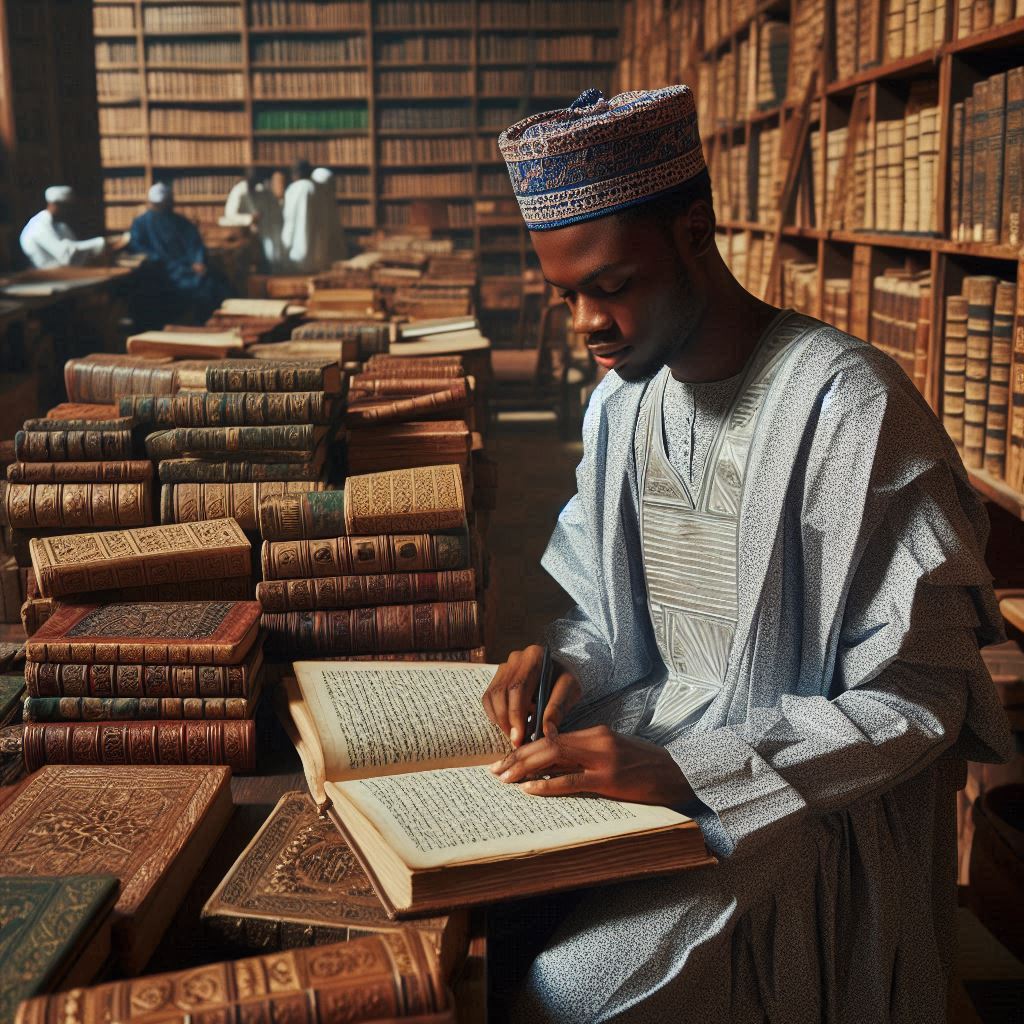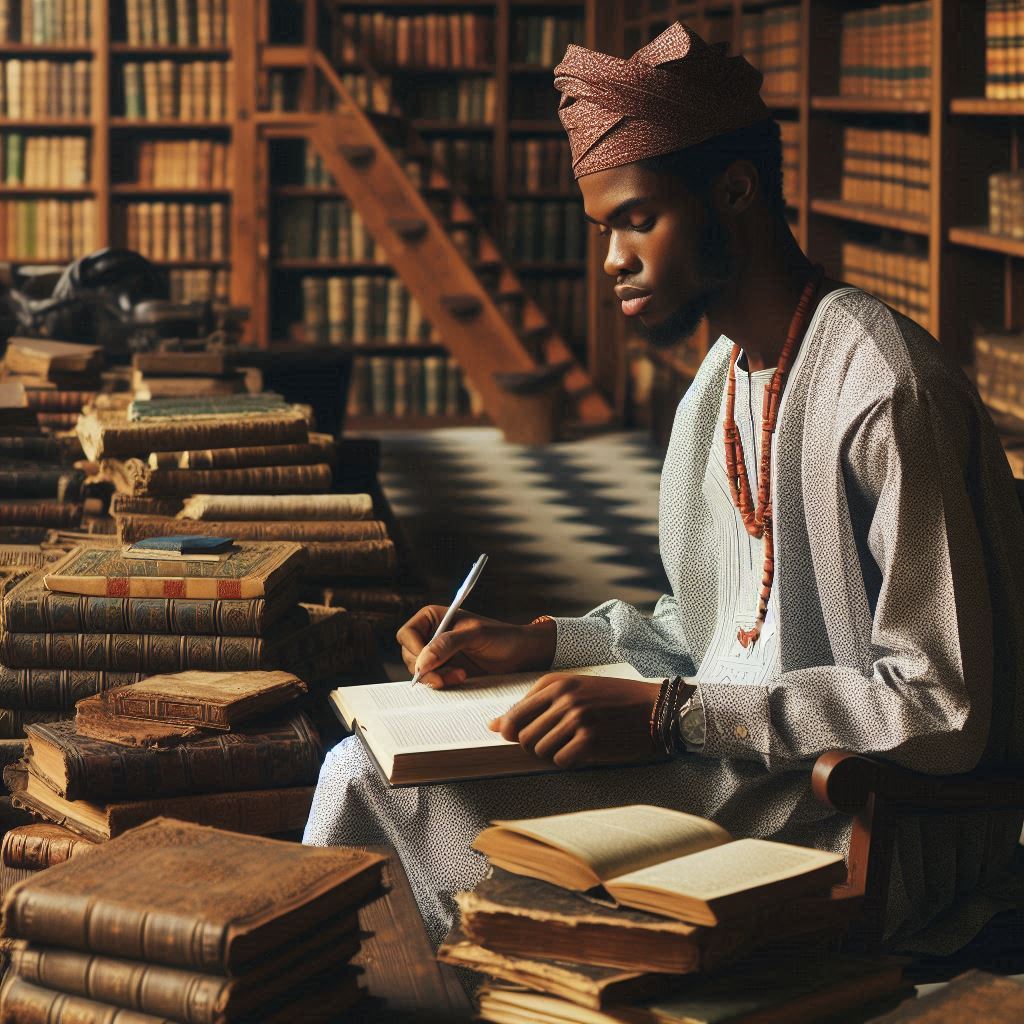Introduction
Oral traditions are foundational to Nigerian historical research, providing a rich tapestry of narratives and cultural insights.
They encapsulate the collective memory of communities, passing down stories, customs, and wisdom from generation to generation.
In Nigerian societies where written records were limited or non-existent, oral traditions served as the primary means of preserving history.
The importance of oral traditions in preserving history cannot be overstated.
They offer unique perspectives and narratives that complement written records, filling gaps and providing alternative viewpoints.
Moreover, oral histories offer a more nuanced understanding of historical events, shedding light on the lived experiences of people throughout Nigeria’s history.
While written records provide valuable documentation, oral traditions offer a dynamic and multifaceted view of the past.
They capture the essence of cultural practices, social norms, and collective memories that may not be found in official documents.
By combining oral and written sources, researchers gain a comprehensive understanding of Nigeria’s complex history.
In summary, oral traditions are invaluable resources for Nigerian historical research.
They offer unique insights, preserve cultural heritage, and complement written records.
By acknowledging the connection between oral and written sources, researchers can uncover a more comprehensive and nuanced understanding of Nigeria’s diverse history.
Definition of Oral Traditions
What Oral Traditions Are
Oral traditions are the cultural narratives, stories, customs, and knowledge passed down verbally from generation to generation.
In Nigeria, these traditions serve as vital repositories of the country’s rich history, encompassing a wide array of tales, myths, legends, songs, proverbs, rituals, and more.
They are the living embodiment of collective memory, reflecting the experiences, beliefs, values, and wisdom of diverse communities across the nation.
Role of Oral Historians in Preserving and Passing Down Traditions
Oral historians, also known as griots or storytellers, play a pivotal role in preserving and perpetuating oral traditions.
These custodians of cultural heritage are entrusted with the responsibility of memorizing, recounting, and transmitting the stories and traditions of their communities.
Through their skillful narration, they ensure that the knowledge and wisdom embedded within oral traditions are passed down intact from one generation to the next.
Oral historians serve as cultural guardians, safeguarding the authenticity and integrity of Nigeria’s rich oral heritage.
Examples of Oral Traditions in Nigerian Culture
Nigeria boasts a kaleidoscope of oral traditions that reflect the country’s diverse cultural tapestry.
Folktales, passed down through generations, captivate audiences with their imaginative narratives and moral lessons.
Stories of mythical creatures, legendary heroes, and epic battles transport listeners to enchanted worlds filled with wonder and adventure.
Proverbs, succinct yet profound, convey timeless wisdom and cultural values.
They serve as guiding principles for navigating life’s complexities and offer insights into the beliefs and philosophies of Nigerian society.
Proverbs like “A bird does not sing in a foreign land without a cause” encapsulate universal truths and provide valuable lessons for interpersonal relations and societal behavior.
Oral epics, such as the “Epic of Sundiata” among the Hausa and Fulani peoples, are epic poems recounting the heroic deeds of legendary figures and historical events.
These epic narratives celebrate courage, resilience, and the triumph of good over evil, while also preserving the collective memory of past generations.
These oral traditions serve diverse purposes, from entertainment and education to cultural preservation and identity formation.
They foster a sense of belonging and continuity, connecting Nigerians across generations and reinforcing cultural pride and heritage.
Essentially, oral traditions are integral to Nigerian culture and historical research.
They provide invaluable insights into the country’s past, enriching our understanding of its diverse communities and shaping our collective identity.
Through the efforts of oral historians and the enduring legacy of oral traditions, Nigeria’s rich cultural heritage continues to thrive and inspire generations to come.
Read: Famous Nigerian Alumni of Communication Arts Programs
Significance of Oral Traditions in Nigerian Historical Research
How Oral Traditions Provide Insights into Pre-Colonial History
Oral traditions serve as invaluable windows into Nigeria’s pre-colonial history, offering unique perspectives and insights into the lives, customs, and experiences of past generations.
Before the advent of written records, oral narratives served as the primary means of preserving historical events, transmitting knowledge, and fostering cultural continuity.
Through the oral recounting of myths, legends, folktales, songs, and rituals, communities passed down stories of their origins, migrations, wars, conquests, and achievements.
These narratives, though often embellished over time, contain kernels of historical truth and provide a vivid depiction of pre-colonial societies, their social structures, governance systems, and religious beliefs.
Challenges and Limitations of Relying Solely on Written Records
Relying solely on written records presents challenges and limitations in understanding pre-colonial history.
Written accounts may be biased, subjective, or influenced by the perspectives of colonial administrators, missionaries, or historians.
Moreover, the scarcity of written sources from indigenous perspectives further complicates efforts to reconstruct the past accurately.
In many cases, written records may only capture the perspectives of the literate elite or ruling classes, neglecting the voices and experiences of marginalized groups, such as women, peasants, or ethnic minorities.
Additionally, the passage of time, cultural biases, and linguistic barriers may distort or obscure the meaning of written texts, making interpretation challenging for modern historians.
Oral Traditions as a Source of Cultural Identity
Despite these challenges, oral traditions remain a vital source of cultural identity and historical understanding in Nigeria.
They connect individuals to their ancestors, heritage, and shared values, fostering a sense of belonging and continuity across generations.
Oral narratives transmit knowledge, beliefs, customs, and rituals from one generation to another, preserving the essence of indigenous cultures amidst modernization and globalization.
Through storytelling, songs, dances, and ceremonies, communities reaffirm their cultural identity, celebrating their unique traditions and collective experiences.
Oral traditions serve as a powerful tool for cultural resilience, enabling communities to assert their autonomy, resist assimilation, and assert their rights to self-determination.
In this way, oral traditions not only provide insights into Nigeria’s pre-colonial history but also contribute to the preservation and promotion of cultural diversity in the face of ongoing social and economic changes.
Read: Digital Media Trends in Communication Arts
Integration of Oral Traditions in Historical Research
Methods of collecting and documenting oral traditions
- Interviewing elders and community members
- Recording stories, myths, and legends
- Transcribing and translating the oral accounts
- Comparing oral traditions with written records
Challenges faced in verifying oral accounts
- Lack of consistency among storytellers
- Memory distortions over time
- Differences in perspectives and interpretations
- Difficulty in separating facts from fiction
Collaboration between oral historians and academic researchers
- Sharing of knowledge and expertise
- Validation and cross-referencing of information
- Respect for the integrity of oral traditions
- Publication of joint research findings
Overall, the integration of oral traditions in historical research enriches the understanding of Nigeria’s past and provides a more comprehensive and inclusive narrative of its history.
Read: Communication Arts: Job Prospects and Salaries

Case Studies of Oral Traditions in Nigerian History
Examples of Oral Traditions Shaping Historical Narratives
Oral traditions play a significant role in shaping historical narratives in Nigeria. They provide a unique perspective that complements written records and adds depth to the understanding of the past.
- Proverbs and Sayings: Proverbs are a common oral tradition in Nigeria. They convey cultural norms, values, and beliefs through generations. For example, the Yoruba proverb, “A child not embraced by the village will burn it down to feel its warmth,” emphasizes community importance in Nigerian society.
- Folktales and Legends: Folktales are another important oral tradition that shapes historical narratives in Nigeria. These stories often contain moral lessons or explain natural phenomena. The story of the creation of the world in Igbo mythology, for instance, provides insights into the belief systems of the Igbo people.
- Oral Histories: People pass down oral histories, firsthand accounts of past events, from one generation to the next. These narratives offer grassroots perspectives. They reveal aspects of the past overlooked in written records. For instance, local communities provide counter-narratives to colonial histories.
Impact of Oral Traditions on Understanding Cultural Practices
Oral traditions also play a crucial role in understanding cultural practices in Nigeria. They offer insights into the customs, rituals, and social structures that shape Nigerian society.
- Rituals and Ceremonies: Oral traditions often preserve knowledge of traditional rituals and ceremonies that are central to Nigerian culture. For example, the oral traditions of the Yoruba people describe weddings, funerals, and festivals, highlighting their significance in Yoruba society.
- Spiritual Beliefs: Oral traditions reveal the spiritual beliefs and practices of different ethnic groups in Nigeria. For instance, the oral traditions of the Hausa people contain accounts of religious ceremonies, sacrifices, and prayers that offer insights into Hausa spirituality.
- Social Customs: Oral traditions document social customs and norms that govern interpersonal relationships in Nigerian communities. For example, the oral traditions of the Ijaw people include codes of conduct for family interactions, neighbors, and elders, revealing Ijaw social structure.
Stories Passed Down Through Generations
One of the most valuable aspects of oral traditions in Nigerian history is the preservation of stories that are passed down through generations.
These stories illuminate the experiences, struggles, and triumphs of the Nigerian people.
- Resistance Against Colonialism: Oral traditions often include accounts of resistance against colonial rule in Nigeria. Stories of courageous leaders, battles, and strategies against oppression offer perspectives on independence struggles not found in official histories.
- Heroes and Heroines:Oral traditions celebrate Nigerian heroes and heroines who contributed significantly to their communities. These stories inspire pride and identity among Nigerians, emphasizing cultural heritage’s role in shaping national identity.
- Survival in the Face of Adversity: Oral traditions also convey stories of resilience and survival in the face of adversity. Tales of perseverance, resourcefulness, and community support showcase the strength of the Nigerian people in overcoming challenges throughout history.
Generally, oral traditions in Nigerian historical research provide a rich tapestry of stories, customs, and beliefs that offer a nuanced understanding of the past.
By incorporating oral traditions into historical narratives, researchers can gain a deeper appreciation of Nigerian culture and heritage.
Read: Impact of Communication Arts on Nigerian Media
Uncover the Details: Scholarships for International Politics Students Nigeria
Discover More: Military History and Strategic Studies in Nigeria
Delve into the Subject: Tips for Improving Foreign Language Pronunciation
Find Out More: Top Careers in Translation and Interpretation in Nigeria
Oral Traditions as a Tool for Social Change
Oral traditions play a crucial role in challenging dominant historical narratives by providing alternative perspectives on events and individuals.
By sharing stories passed down through generations, marginalized voices are empowered to contribute to the understanding of history and shape future narratives.
How oral traditions challenge dominant historical narratives
- They provide unique perspectives on historical events
- They challenge the Eurocentric view of history
- They offer insights into the experiences of marginalized groups
Empowerment of marginalized voices through oral histories
Oral histories give a platform to individuals and communities whose stories have been overlooked or silenced in mainstream historical accounts.
By sharing their experiences through oral traditions, marginalized groups can reclaim their narratives and challenge existing power structures.
Preservation of cultural heritage through storytelling
- Oral traditions help preserve cultural practices and beliefs
- They pass down cultural knowledge from one generation to the next
- They promote the continuity of cultural identity
Overall, oral traditions serve as a powerful tool for social change. They amplify marginalized voices, challenge dominant narratives, and preserve cultural heritage for future generations.
See Related Content: Extracurricular Activities in Nigerian Music Schools
Gain More Insights: Nigerian Contributions to Global Political Science
Discover More: Conferences and Seminars in History & Strategic Studies
Discover More: Professional Certifications in Communication Arts
Uncover the Details: Women in Arabic and Islamic Studies Nigeria
Preservation and Documentation of Oral Traditions
Importance of Recording Oral Histories for Future Generations
Recording oral histories is crucial for preserving Nigeria’s rich cultural heritage and historical legacy.
These narratives offer invaluable insights into the lives, traditions, and experiences of past generations.
By capturing the voices of elders, storytellers, and community members, oral histories provide a unique perspective on events and phenomena that may not be documented in written records.
They offer a glimpse into the social dynamics, customs, beliefs, and values of diverse Nigerian communities, enriching our understanding of the past and informing our present and future.
Moreover, oral histories serve as a vital link between generations, fostering a sense of continuity, connection, and identity among individuals and communities.
By documenting oral traditions, we ensure that the knowledge, wisdom, and cultural heritage of Nigeria are preserved and passed down to future generations.
Role of Technology in Preserving Oral Traditions
Technology plays a pivotal role in preserving oral traditions in Nigeria.
Digital recording devices, audiovisual equipment, and online platforms have revolutionized the way oral histories are collected, archived, and disseminated.
These technologies enable researchers, historians, and cultural practitioners to capture high-quality audio and video recordings of oral narratives, ensuring their preservation for posterity.
Furthermore, digital archives and databases provide accessible platforms for storing, cataloging, and sharing oral histories with a wider audience.
Online platforms, such as websites, podcasts, and social media channels, facilitate the dissemination of oral narratives to diverse audiences, both within Nigeria and globally.
Additionally, advances in digital preservation techniques, such as digitization and metadata tagging, enhance the long-term storage and accessibility of oral history collections, safeguarding them against loss or degradation over time.
Initiatives to Safeguard and Promote Oral Traditions in Nigeria
Several initiatives aim to safeguard and promote oral traditions in Nigeria, ranging from grassroots movements to institutional partnerships.
Cultural organizations, universities, research institutions, and community-based groups collaborate on various preservation efforts.
One notable initiative is the establishment of oral history archives and repositories, which serve as centralized hubs for storing, organizing, and disseminating oral narratives.
These archives employ trained archivists and oral historians to curate collections, conduct research, and provide access to scholars, students, and the general public.
Furthermore, educational programs and workshops train community members in oral history documentation techniques, empowering them to collect and preserve their own narratives.
By engaging local storytellers and community members as active participants in the preservation process, these initiatives ensure the authenticity and integrity of oral traditions.
Additionally, multimedia projects leverage technology to create interactive platforms for sharing oral narratives, including websites, podcasts, mobile apps, and virtual reality experiences.
These initiatives amplify the voices of storytellers, engage audiences in immersive storytelling experiences, and foster a deeper appreciation for Nigeria’s oral heritage.
Through these concerted efforts, Nigeria is actively preserving its oral traditions for future generations, honoring the past while embracing the possibilities of the digital age.
Explore Further: Fine vs. Applied Art: Key Differences Explained
Discover More: Best Criminology & Security Programs in Nigeria
Conclusion
Therefore, oral traditions hold immense significance in Nigerian historical research, serving as invaluable repositories of cultural heritage and collective memory.
Throughout this exploration, we have witnessed how oral narratives provide unique insights into the lives, customs, and experiences of past generations, enriching our understanding of Nigeria’s complex history.
It is imperative to recognize the importance of integrating oral histories with written records.
By combining these sources, historians can create a more nuanced and comprehensive narrative of Nigeria’s past, capturing the diverse perspectives and experiences of its people.
As we reflect on the significance of oral traditions, we must also acknowledge the urgent need to preserve and value them for future generations.
It is our responsibility to safeguard these cultural treasures, ensuring that they continue to enrich our understanding of Nigeria’s heritage and identity.
Let us heed this call to action and work together to preserve and celebrate Nigeria’s rich oral traditions for generations to come.




